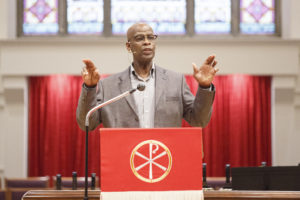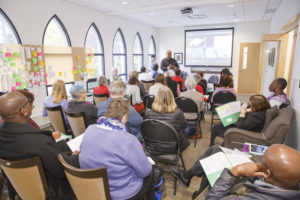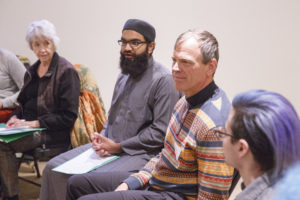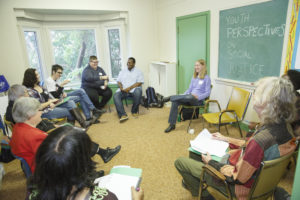By Murray MacAdam
Participants at the diocese’s annual Outreach and Advocacy Conference heard a powerful call to work for equity in the Church and society, and grappled with ways to bring it about. The conference, held on Nov. 4 at St. John, York Mills, drew 100 people from across the diocese and marked the first time that the event focused on racial and ethnic diversity.

Keynote speaker Dr. Carl James, the Jean Augustine Chair in Education at York University, spelled out the difference between equity and equality, and highlighted how inequality is built on racism. “We don’t want equality of opportunity, because that means treating everyone the same,” he said. “What we want is equity, which takes everyone’s situation into account and is based on justice.”
Canadians are proud of their country as a multicultural oasis, a colour-blind society, said Dr. James. Yet while most people don’t like talking about it, race is a core reality of life in Canada, he noted. “Whiteness is taken for granted,” he said, and we need to think about how whiteness, which we see as “normal,” is impacting our lives. “If we think that the best priest is a white priest, then we are using whiteness,” he said.
Diversity is an ongoing challenge, and we need to think about diversity in all we do. “The work we have to do is bring people to a consciousness that we’re all in this together,” he said. We need to constantly think about what offends people from other backgrounds, which is not always easy. “We have to become comfortable with uncomfortability,” he added.
A lively question period followed his address. Bishop Peter Fenty, the area bishop of York-Simcoe, asked how we can respond to racist comments, and asked, “How do we confront the fact that systemic racism is real?”

The Rev. Canon Don Butler, incumbent of Trinity, Barrie, said that when he strolls along Barrie’s waterfront at night, people steer clear of him as a tall black man. When he did the interment service for a local resident, people were shocked to see a black priest. He appealed to the audience to have courage to confront racism, “to be mindful of who we are called to be as people of God.”
Workshops explored issues of accessibility, understanding privilege, confronting racism, Indigenous issues, youth and social justice, and climate change. Brother Reginald-Martin Crenshaw, OHC, an associate at St. Paul, Rexdale, led a workshop on dismantling racism in the parish. It defined racism as racial bias combined with the misuses of structures and institutions, so that one group’s racial bias is institutionalized by its power, based on its perceived racial superiority. The workshop contrasted personal and systemic racism, with the latter, like the water in which a fish swims, being so pervasive that it is not perceived easily. Everyone is born into it and socialized to play well-defined roles.
The Rev. Gary van der Meer, incumbent at St. Anne, Toronto, provided a practical example of interfaith inclusion in action during a workshop he led with Imam Ilyas Ally. The workshop focused on the growing friendship between St. Anne’s and Imam Ally’s Muslim community. It has included interfaith learning events and joint sponsorship of a refugee family.

Mike Walker, a student completing a doctorate on a theology of disability, told a workshop on accessibility and solidarity that “ableism is a sin” (ableism is discrimination in favour of able-bodied people). He has cerebral palsy, and after noting that people with disabilities are sometime labeled as a “retard”, or a “cripple,” he said, “I’d rather have names like friend or brother,” his voice cracking with emotion.
Participants explored the notion of “sacramental solidarity” and how baptism and Holy Communion can lead all people into Jesus’ embrace. They agreed with a suggestion that the Church develop official programs to educate parishes on disability issues, just as it does on sexual misconduct concerns.
Karri Munn-Venn of Citizens for Public Justice led a climate change workshop in which participants highlighted the people and places most immediately impacted by climate change: people of colour, former colonies, and communities that have contributed little to the problem. A discussion outlined the inconsistencies in Canada’s approach to climate change, including tensions between respect for Indigenous rights and pipeline approval, and between the Paris Agreement and ongoing fossil fuel subsidies. The workshop wrapped up with an impassioned call to minimize our environmental impacts, engage church leaders on the Christian imperative to care for the Earth, and to demand action from the federal government.
Parishes were invited to take part in CPJ’s Give it up for the Earth! Campaign, which invites individuals to commit to reducing greenhouse gas emissions, while urging the federal government to increase climate action. For more information, visit: cpj.ca/for-the-earth.
Take a risk for inclusion, workshop hears
An outreach conference workshop on youth and social justice challenged the popular notion that young people are “the future” of the Church, noting that young people are already active church members.

Workshop leader Cormac Culkeen, director of youth ministries at St. John, West Toronto, noted that there’s often a divide between adults and youth, which parishes try to bridge by hiring youth workers. Some adults even feel unqualified to talk to young people.
“You don’t have to be 25 to talk to a 15-year-old,” said Cormac Culkeen. “You don’t even have to have common interests.” The main thing is to show an interest in young people. St John’s runs a drop-in program for 100 local high school students and one of the program’s best volunteers was 90 years old. The youth loved her because of her interest in them.
Youth are drawn to involvement in the youth program at Church of the Redeemer, Bloor Street in Toronto because of their strong interest in social justice, said Alexandra MacIntosh, parish director of youth and young adults. Her challenge is to connect that interest with Christian faith.
Two young people from St. John, West Toronto’s youth group offered practical advice. Anferne Cadogan urged parishes to make spaces for youth to show their leadership and skills. Sam Forbes, who is autistic and has an intellectual disability, gave a powerful presentation on how his life was transformed after a Starbucks manager offered him a job. He became famous after a YouTube video of him dancing at work went viral. Now he wants to be known as an advocate for inclusion, rather than as a “dancing barista.”
He linked his message about the importance of inclusion and making space for people with special needs through insightful reflections about the example set by Jesus. “For Jesus, love and justice were interconnected. One thing that Jesus got in trouble for during his life was that people thought Jesus was too inclusive. He didn’t mind if sick people touched him. He hung out with poor people and people no one wanted to hang out with. He ate with women who had ‘bad reputations.’ Jesus stuck up for people that no one else would stick up for. Jesus showed that it was more important to love everyone no matter who they are, than to follow society’s expectations. We should do that more. Take a chance, and go for justice and inclusion. People who are different from you have a lot to teach you.”
Murray MacAdam is a freelance writer.